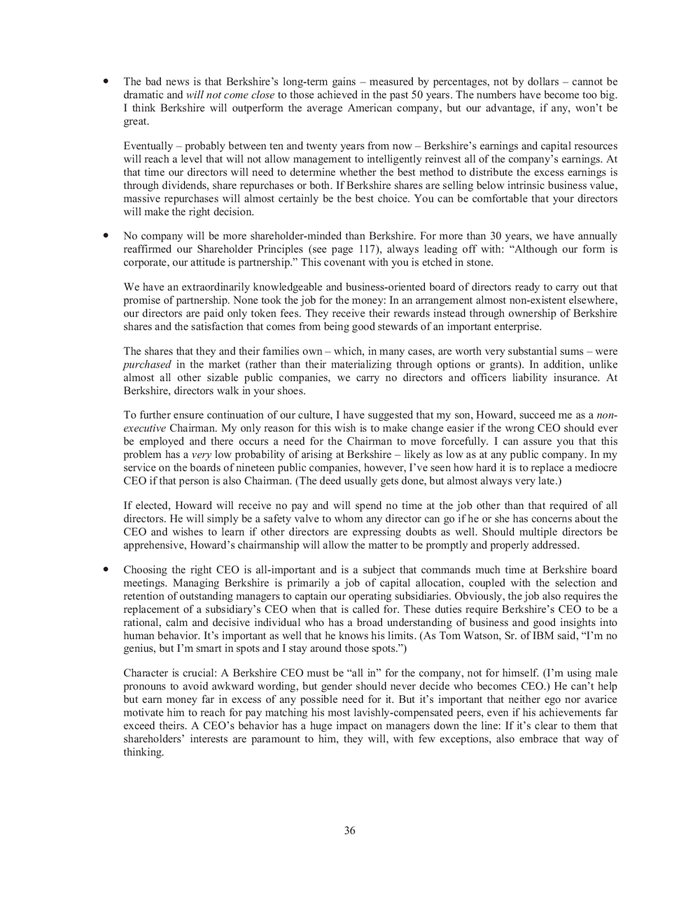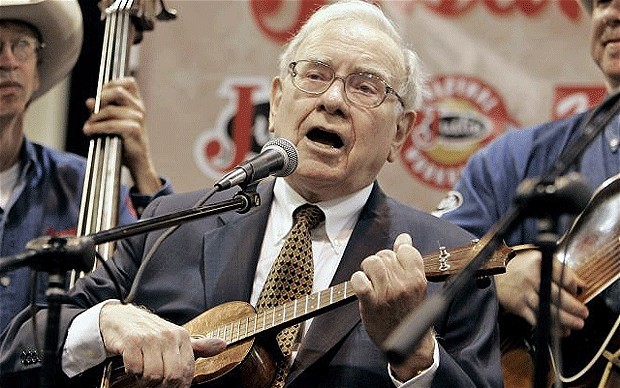Why Warren Buffett’s Values Make Berkshire a Value
Post on: 16 Март, 2015 No Comment

A new book details how Berkshire Hathaway is built to outlast its legendary chairman
Should you leave Berkshire before Buffett does? No way, Cunningham says.
Conglomerates are generally thought to be 1960s-era relics noted especially for value-destroying culture clashes and a lack of managerial focus. Think AT&T and Litton Industries, whose assets were carved up and redeployed long after their glory days passed.
But theres another conglomerate which may yet prove the worth of the resiliency, under certain conditions, of this model.
Berkshire Hathaway, Warren Buffetts holding company, is still going strong after 50 years of his ownership, with 50-plus constituent companies employing 300,000 workers and with a market cap greater than $300 billion.
Does Buffett bring something unique to this enterprise that suggests its durability beyond the lifespan, or resignation, of its still active 84-year-old chairman, president and CEO?
In other words, can Berkshire survive the absence of Buffett or should investors with eyes open to the march of time bail out before nature or changing life priorities takes their course?
According to Lawrence Cunningham, author of the new book Berkshire Beyond Buffett . to be released later this month, Berkshire is a buy, and his books subtitle the enduring value of values provides the reason.
In other words, despite a far-flung corporate empire whose products range from insurance to shoes to chocolate and so much more, there are nevertheless common values that guide Berkshire, underpin its success and ensure its continuity beyond Buffetts personal involvement.
Those values, says Cunningham in an interview with ThinkAdvisor. include norms of thrift, integrity, entrepreneurship, trust, and a sense of permanence, which he says are deeply rooted in Berkshire subsidiary companies themselves.
While many investors think of Buffett as a genius stock picker, one of Cunninghams key insights is that he has quietly transformed his career over the past decade to that of business manager.
Even deep into 90s, 80% of Berkshires [share holdings] was in stock picks and 20% in businesses today its exactly the other way around.
A portfolio managers task includes monitoring positions and selling when economic characteristics deteriorate, Cunningham continues. Berkshire has done that. In contrast, the owned companies are never sold.
So, whereas Buffett sold his shares of Walt Disney Co. in 1999 when he lost confidence in its then-CEOs management style, the Berkshire chairman will never sell Sees Candies even if Sees cant sell candy on the Internet in 2015, Cunningham quips.
Indeed, the value of permanence may be the most important of nine key values Cunningham sees as the source of Berkshires success.
Apart from a not unimportant economic benefit that companies will sell at a discount to competing market offers because they believe in Buffetts promises not to re-sell the value of permanence is that it frees a company to manage its business, through the inevitable ups and downs, for the long term.
Entrepreneurs and companies that had been through leveraged buyouts, or acquired by private equity firms that flipped them, or went into bankruptcy and emerged are aching for a sense of permanence to look out 20, 30, 50 years and not worry that if we dont do something that this guy wants well be divested, Cunningham says.
Buffetts promises of permanence are conveyed orally to the acquiree, written in annual reports and letters to shareholders and, critically, are backed up by 45 years of history, he says. Even the company that struggles is not sold.
A telling example of the result of this attitude comes from Jim Weber, the CEO of running-shoe company Brooks Sports, which had been owned by several different companies for short periods, with some owners wanting Weber to diversify across athletic brands, others demanding he keep a narrow focus.
Buffett, in contrast, asked Weber what he wanted to do. To Webers reply, Buffett said, just do that, Cunningham relates.
The grateful CEO responded poignantly, in an interview with Cunningham for his new book:
In my long business career, I have never had so much autonomy and felt so accountable.
Indeed, autonomy is another crucial Buffett value.
Managers are given responsibility for making decisions and are not second-guessed, Cunningham says.
Despite his extensive knowledge of insurance, for example, Buffett isnt telling Berkshire subsidiary Geico how to set its policy rates. Company managers themselves make strategic decisions, and they in turn delegate other responsibilities down to the appropriate level.
The motif of autonomy is a belief in human beings, Cunningham says. If you trust people with responsibility to run their own business and call their own shots, companies will do better than they would with second-guessing from a senior level.

So what does Buffett himself do if he is delegating operating decisions to others?
He primarily does two things, Cunningham says.
He decides what to do with the money that these businesses spin off, whether to reinvest in the business or put elsewhere capital allocation, in other words.
And he works as cheerleader for the culture. Hes been doing that much more consciously and actively in recent times, says Cunningham, who notes this was in evidence last week in announcing Berkshires latest acquisition, Van Tuyl Group, the nations fifth-largest auto retailer.
Buffett described the company as a perfect fit for Berkshire financially and culturally. He has never made culture so prominent and explicit in a press release, Cunningham says.
The author believes Buffett is consciously deepening the foundations of a business that can survive the chairmans departure.
And, indeed, a small-sample survey he conducted for his book of 500 Berkshire shareholders explicitly asking what they would do in the event that Buffett stepped down or died showed overwhelming support for holding, significant support for further buying and very limited interest in selling.
My own senseis that my survey makes sense because the company is enormously valuable and probably more valuable than the current market price, says Cunningham, who anticipates a fight between traditionalist shareholders who subscribe to Buffetts values and activist shareholders who prefer the immediate gain of selling underperforming subsidiaries.
If that scenario indeed played out, Cunningham thinks Berkshires price would ironically go up because big players, for example, Hersheys or Nestle, would step up to buy a company like Sees and probably offer more than its current valuation.
But based on his estimate of the demographics of Berkshire shareholders, Cunningham thinks the traditionalists will have the votes; moreover, he says the conglomerate is well populated with potential successors who understand the Berkshire culture who will fight and are committed to [Buffetts] approach.
Cunningham, for his part, is a Berkshire buyer. He owns both the stocks A and B shares, which he considers moderately undervalued in an overall market that looks frothy to me.
Whats more, the author and George Washington University law school professor takes comfort in the so-called Buffett put, noting Berkshire has a standing commitment to repurchase its own shares if the market value declines to 1.2 times its book value.
Related on ThinkAdvisor:














